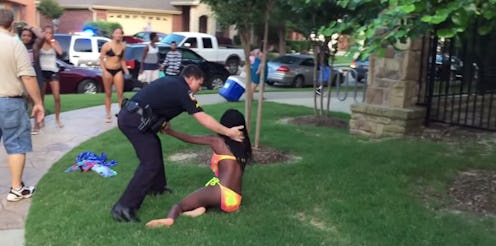News
Black Women Face Police Brutality, Too

A graphic video surfaced online this weekend that showed yet another aggressive arrest of a black teenager by a white police officer. But a Friday incident at a McKinney, Texas, pool party slightly falls off the narrative we've come to know: Rather than a young black male, a young black female was the subject of the arrest. We've talked about the deaths of black women at the hands of police before, but in light of the violent encounter, the topic is worth visiting again. Because yes, along with black men, black women face police brutality too.
Identified by The Dallas Morning News as the primary officer in the video, Eric Casebolt has been put on administrative leave pending an investigation. With an extensive background in martial arts, Casebolt appeared to be in complete control of the situation (with no visible threat present) when he forced a black teenager girl to face the ground, placing his body weight on her back. At one moment during the arrest, you see Casebolt pulling her hair. He also is seen whipping out his gun when several teenagers step forward to protest.
During a Sunday news conference, McKinney Police Chief Greg Conley said the young girl was detained and then released to her parents without charge. And as horrific as her experience was, at least she wasn't arrested, convicted, incarcerated, and/or killed — a reality that she, as a young black woman, is more likely to face.
According to the NAACP, black people make up nearly 50 percent of all 2.3 million inmates in the United States. The Bureau of Justice Statistics also said one in three black men will go to prison during his lifetime. While racial disparities among women are less significant, they're very much still real. For black women, one in 100 will go to prison, and black women are three times more likely than white women to be incarcerated, according to the Women's Prison Association. As a whole, blacks are incarcerated at nearly six times the rate of whites.
These numbers don't lie. We have a serious racial problem in our country's judicial system, and it's important to not forget that it stacks against both men and women. The #SayHerName campaign sheds light on stories of black women killed by police — such as Rekia Boyd, Tyisha Miller, and Aiyana Jones — whose deaths didn't capture the same national attention as Trayvon Martin, Michael Brown, and Eric Garner.
While black men may statistically experience more racial bias within the judicial system compared to black women, the experience is the same, regardless of gender. Racial bias within local jurisdictions often treat black men and women the same. According to Say Her Name, half of all New York police stops in 2013 involved a black man or woman.
The officers in the video appeared to target a specific profile of teens at the pool party, a profile that has become a very familiar narrative when it comes to police arrests. An entire community in this country is maligned based on the color of their skin, and it shouldn't take some online videos to make that point clear — or effect change.